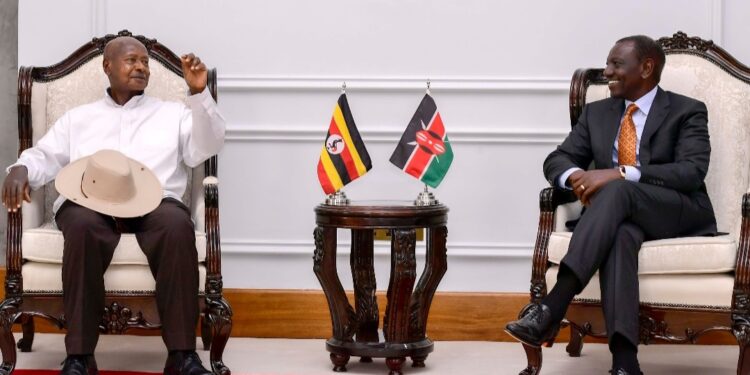In a significant move to bolster regional trade and cooperation, Kenya and Uganda have signed a tripartite agreement allowing Uganda’s state oil firm to import petroleum products through Kenya. The announcement was made on Thursday by President William Ruto following a meeting with his Ugandan counterpart, President Yoweri Museveni, at State House, Nairobi.
He said the two nations had agreed during the second session of the Joint Ministerial Meeting (JMC) held early this week in Kampala where seven instruments of cooperation were signed.
“The Tripartite Agreement on the Importation and Transit of Refined Petroleum Products through Kenya to Uganda whose signing we have just witnessed enables the Uganda National Oil Company Limited to Import refined petroleum commodities directly from producer jurisdictions thus bringing to an end the challenges faced by the sector In Uganda,” stated Ruto.
According to President Ruto, the seven MoUs signed helped to resolve other trade barriers between the two countries. The other agreements included MoUs in Education cooperation, sports, youth affairs, Public Service Management and Development and cooperation between Foreign Service institutions.
President Ruto further noted that the two nations had also agreed to jointly extend the Standard Gauge Railway from Naivasha to Kampala to DRC.
“The meeting also emphasized the importance of extending the SGR not only from Naivasha to Malaba but all the way to Kampala and DRC as an efficient and sustainable Infrastructural artery for the transportation of goods,” he said.
“We have obliged our respective Ministers to take joint urgent measures to mobilize resources for the implementation of this regional shared Infrastructure and report on progress by the end of 2024.”
Uganda and Kenya have reached an agreement to resolve their months-long dispute over oil transportation, marking a significant step towards regional cooperation and economic integration.
The conflict began when Nairobi denied Uganda’s government-owned oil marketer, Uganda National Oil Company (UNOC), a license to operate locally and handle fuel imports destined for Kampala. This decision included the refusal to allow the use of Kenya Pipeline Company (KPC) infrastructure for moving Uganda’s refined petroleum products from the Mombasa port to Uganda, causing a significant bottleneck in fuel supply.
The tension escalated, leading Uganda to file a lawsuit against Kenya at the East African Court of Justice on December 28. The lawsuit accused Kenya of violating regional trade agreements by denying UNOC the right to operate as an Oil Marketing Company (OMC) within Kenya.
The newly brokered agreement now permits UNOC to use KPC’s infrastructure for the transportation of its petroleum products from Mombasa to Kampala. This development is expected to enhance the efficiency and reliability of fuel transportation between the two countries, easing previous logistical challenges and fostering economic growth.
Officials from both nations expressed optimism about the resolution. Uganda’s Minister of Energy and Mineral Development, Ruth Nankabirwa, stated, “This agreement is a testament to our commitment to regional cooperation and the mutual benefits that come from working together. It ensures a steady and reliable supply of petroleum products to Uganda and supports our broader economic goals.”
Kenya’s Cabinet Secretary for Energy and Petroleum, Davis Chirchir, echoed these sentiments, emphasizing the importance of maintaining strong bilateral relations. “This resolution is not only about oil transportation but also about strengthening our ties and ensuring that our economic interests are aligned for the benefit of both countries,” Chirchir said.
The settlement is seen as a victory for regional integration efforts within the East African Community (EAC), demonstrating the ability of member states to resolve disputes amicably and collaboratively. The agreement is also expected to set a precedent for handling similar conflicts in the future, reinforcing the principles of cooperation and mutual benefit that underpin the EAC.
With the dispute behind them, Uganda and Kenya are now looking forward to deepening their economic ties and exploring further opportunities for collaboration in the energy sector and beyond. The swift resolution of this issue underscores the importance of dialogue and negotiation in addressing cross-border economic challenges.
As the infrastructure is now open for use, the flow of petroleum products between Mombasa and Kampala is expected to stabilize, benefiting consumers and businesses in both nations. The agreement marks a new chapter in Uganda-Kenya relations, highlighting a shared commitment to economic development and regional stability.
Do you have a story in your community or an opinion to share with us: Email us at editorial@watchdoguganda.com













